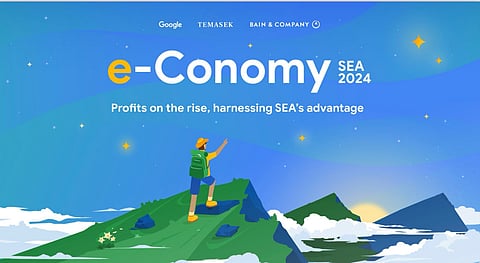
- NEWS
- the EDIT
- COMMENTARY
- BUSINESS
- LIFE
- SHOW
- ACTION
- GLOBAL GOALS
- SNAPS
- DYARYO TIRADA
- MORE

The Philippines has reclaimed its status as the fastest-growing internet economy in Southeast Asia, according to the latest Google, Temasek, and Bain & Company e-Conomy SEA Report, announced by the Department of Trade and Industry (DTI) on Wednesday.
The 9th edition of the Google e-Conomy SEA Report showed a 20 percent growth in the overall digital economy based on Gross Merchandise Value (GMV), rising from $26 billion to $31 billion in 2024.
“The increase in digital payment volumes is compelling service providers to maintain competitive fees while enhancing security and service reliability. As the digital payments landscape matures and adoption becomes more widespread, e-wallet providers are increasing merchant discount rates. Super-apps are expected to maintain their prominent role in digital payments, with their comprehensive offering,” the report noted.
For digital infrastructure expansion, Google highlighted that the Philippines is strategically focusing on improving digital access in rural communities.
“A prime example is the recently approved $288 Million Philippine Digital Infrastructure Project. This initiative aims to bolster broadband connectivity nationwide, particularly in remote areas of the country,” it stated.
The report attributes the strong growth to several factors, including robust domestic consumption, a revitalized services sector, and increased remittances from overseas workers. It further notes that stabilizing inflation and declining unemployment are stimulating private consumption and boosting demand for digital services.
Trade Secretary Cristina Roque welcomed the report, crediting this progress to the Marcos administration’s strategic reforms aimed at growing the country’s digital economy.
"The results of the 2024 Google, Temasek, and Bain & Co. Study reaffirms the effectiveness of the administration’s digital economy strategies. The country’s whole-of-government approach fosters economic growth, drives innovation, and ultimately improves the lives of all Filipinos,” said Roque.
“This collective effort includes the DTI’s digitalization of micro, small, and medium enterprises; the DICT’s acceleration of digital infrastructure; the BSP’s promotion of digital payments; the DOF’s adoption of a digital taxation and customs policy, and the Congress' passage of relevant laws,” the trade chief further explained.
The 2024 e-Conomy SEA report also recognized recent reforms, such as the Internet Transactions Act and the 12 percent value-added tax on non-resident digital services, as essential measures for establishing a level playing field between local and international businesses.
The report supports findings from the UNCTAD Digital Economy Report 2024, which identified the Philippines as a leader in e-commerce growth among 43 economies. The UNCTAD study reveals a steady increase in the country's online transactions between 2016 and 2022.
The DTI acknowledged the need for further action and is focusing on fully implementing the Internet Transactions Act. Priorities include the development of an Online Business Database, an Online Dispute Resolution System, an Online Consumer Complaints mechanism, and an E-commerce Trustmark.
Roque emphasized the role of the private sector in this success, adding, “In strong partnership with the private sector, we are actively implementing the e-Commerce Philippines 2028 Roadmap. This roadmap outlines our strategies to stimulate the growth of e-commerce and build trust between online consumers and businesses. We are committed to more vibrant e-commerce, recognizing the vast potential of our large, young, and tech-savvy population."
Roque also views the Philippines' thriving e-commerce sector as a driver of economic growth, job creation, and increased revenue for both businesses and the government. The country’s digital transformation, she said, is crucial for enhancing global competitiveness and attracting foreign investment.
"The Philippines is strategically positioned to maximize its demographic advantages and technological capabilities and become a dominant force in the global digital economy," Roque concluded.
